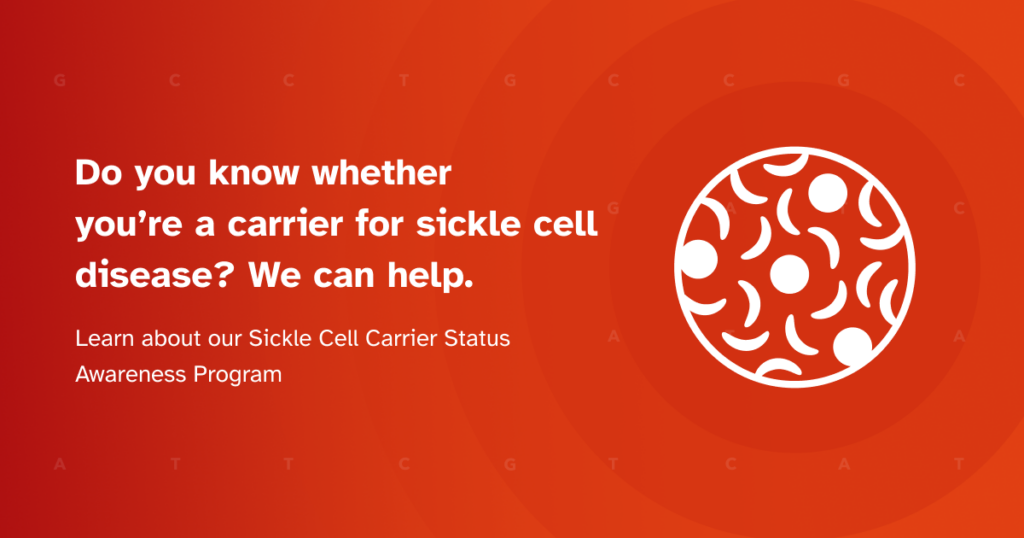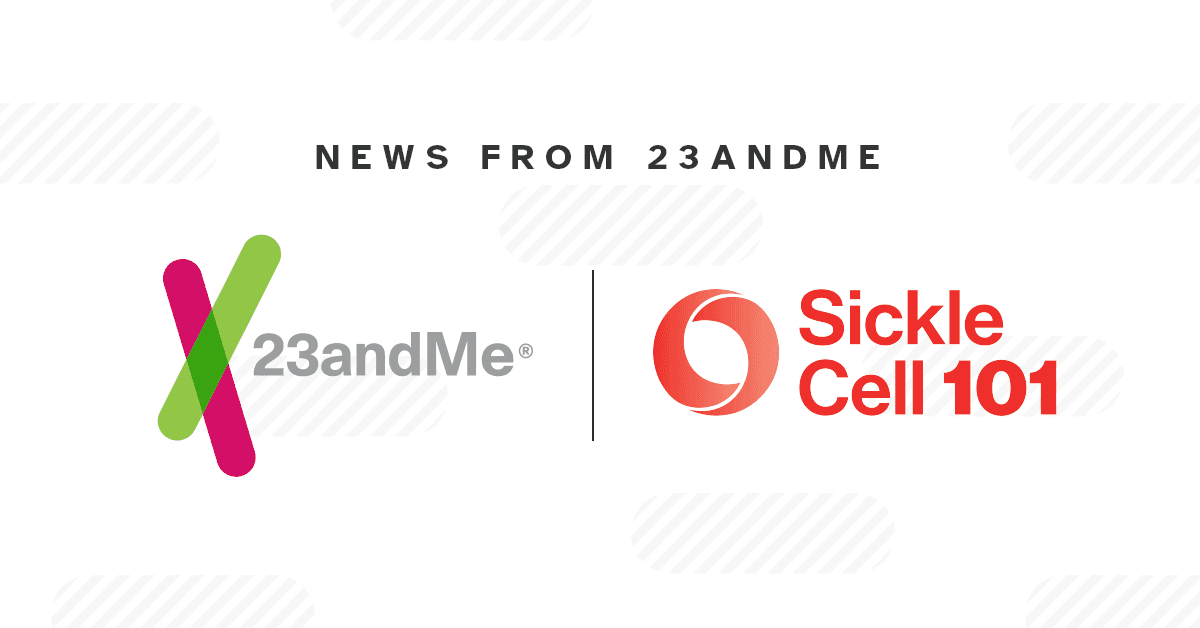23andMe and the non-profit Sickle Cell 101 have joined forces to expand our efforts in raising awareness about people’s sickle cell carrier status.
The Sickle Cell Awareness Program
We are launching this program just as we commemorate Sickle Cell Awareness Month in September. The project will include offering the 23andMe Health + Ancestry Service for free to a limited number of individuals.* In addition, participants will have access to Sickle Cell 101’s online education tools and genetic counselors.
23andMe’s Health + Ancestry Service includes a Sickle Cell Anemia Carrier Status report.** This allows participants to learn their carrier status. 23andMe’s report includes extensive information about what it means to be a carrier of the sickle cell trait. But this collaboration also gives those with additional questions a place to go for answers. For instance, if a person has questions about the differences between having sickle cell trait — a carrier of sickle cell anemia with one copy of the HbS variant — versus having sickle cell disease, they can discuss this with a Sickle Cell 101 genetic counselor. Sickle Cell 101 is the largest global online platform for sickle cell education, awareness, and research.
“This project builds on what we’re already doing at 23andMe,” said Joyce Tung, PhD, 23andMe’s Vice President of Research. “We have research projects underway and an ongoing awareness campaign focused on sickle cell. Partnering with Sickle Cell 101 will allow us to expand that effort to more people. 23andMe is about empowering people through access to their genetic data to make more informed health decisions, which is exactly what this program offers.”
More about Sickle Cell Trait and Sickle Cell Disease
But much work is needed to raise awareness more broadly about these conditions.
The most commonly known form of sickle cell disease is sickle cell anemia. To have sickle cell anemia, one must inherit two copies of the HbS variant. This would be one copy of the HbS variant from each biological parent. People with just one copy of the HbS variant are called carriers; they’re also said to have sickle cell trait. They’re not expected to have sickle cell anemia themselves. They typically do not experience any health complications. However, in rare cases, people with the sickle cell trait may experience some health impacts. You can learn more about sickle cell trait from the CDC and the American Society of Hematology. You can also speak to your healthcare provider or experts at Sickle Cell 101 by contacting ask@sc101.org.
Importantly, carriers can pass their variant on to their future children. If their partner has the HbS variant or another variant in the HBB gene, there’s a 25 percent chance that each child may have sickle cell anemia or a related blood disorder.
Other forms of sickle cell disease are also caused by variants in the HBB gene. Instead of having two copies of the HbS variant, like people with sickle cell anemia, people with other types of sickle cell disease have one copy of the HbS variant and another variant elsewhere in the HBB gene. Examples of other types of sickle cell disease include hemoglobin sickle cell disease and sickle beta thalassemia disease.
• A person must have two copies of the HbS variant in the HBB gene to have sickle cell anemia.
• Typical signs and symptoms of sickle cell anemia include episodes of pain, and frequent infections.
• People with one copy of the HbS variant are carriers of sickle cell disease (sickle cell trait) who can pass the variant on to their future children.
• About 1 in 13 African Americans have the HbS variant but the variant can also be found in people from the Caribbean, the Mediterranean, and part of Central and South America.
Building Awareness, Expanding Research
This project builds on 23andMe’s ongoing awareness program with the Morehouse School of Medicine and the Sickle Cell Foundation of Georgia, Inc. (SCFG). The foundation also created a dedicated webpage for program participants. In addition, anyone who is participating in the 23andMe program to access the site and connect with genetic counselors at SCFG via the following link: Genetic Counseling | Mysite. From those efforts, we learned participants wanted to be able to ask questions about their status. Along with raising awareness about the importance of sickle cell carrier status testing and improving access to testing, this effort will offer additional online resources for people who may have sickle cell trait or have sickle cell disease.
Beyond raising awareness, 23andMe is also committed to learning more about sickle cell through our research. Our scientists are working on sickle cell research, most recently collaborating with scientists at the National Institutes of Health and Johns Hopkins University School of Medicine. The study’s initial findings were presented at the American Society of Hematology’s annual meeting in 2022, but have not yet been published. It is now the largest and most diverse genetic study of sickle cell trait.
More broadly, this effort will help with 23andMe’s efforts to improve the diversity of our research, as participants in the program have the opportunity to consent to participate in research if they choose, which will enable other studies like the Sickle Cell trait research above.

23andMe’s Sickle Cell Anemia Carrier Status Report**
23andMe’s Sickle Cell Anemia Carrier Status Report, which meets FDA requirements for clinical and analytical validity, looks at the HbS variant in the HBB gene, which is linked to sickle cell anemia.
Sickle cell anemia is the most severe form of sickle cell disease. Three-hundred-million people worldwide and one in 13 Black and or African Americans in the United States have sickle cell trait, making them carriers for sickle cell anemia.
In addition to informing people if they have one copy of the HbS variant and are carriers for sickle cell anemia, 23andMe’s report can also tell individuals if they have two copies of the tested variant and if they are at risk of developing symptoms of the condition. But the report does not describe one’s overall risk of developing symptoms.
Because the HbS variant is more common in certain populations, the Sickle Cell Anemia report is most relevant for people of African descent, as well as people of Middle Eastern and South Asian descent, as well as people from the Caribbean, the Mediterranean, and parts of Central and South America.
*Eligibility:
· You live in the United States
· You are at least 18 years old
· You have African ancestry; identify as Black, African American, or of African descent; or you have ancestry from a region where sickle cell disease is common†
· You are willing to provide a saliva sample for DNA testing
· You are willing to agree to 23andMe’s Terms of Service and Privacy Statement
· Research consent is optional and not required for participation in the program
†Regions include Africa, the Middle East, South Asia, the Caribbean, Mediterranean Europe/Asia, Central and South America.
Note:
**The 23andMe PGS test uses qualitative genotyping to detect select clinically relevant variants in the genomic DNA of adults for the purpose of reporting carrier status and reporting and interpreting genetic health risks. The relevance of each report may vary based on ethnicity. Our carrier status reports can be used to determine carrier status, but cannot determine if you have two copies of any genetic variant. These carrier reports are not intended to tell you anything about your risk for developing a disease in the future or anything about the health of your fetus, or your newborn child’s risk of developing a particular disease later in life. For certain conditions, we provide a single report that includes information on both carrier status and genetic health risk. For important information and limitations regarding other genetic health risk reports and carrier status reports, click here.




